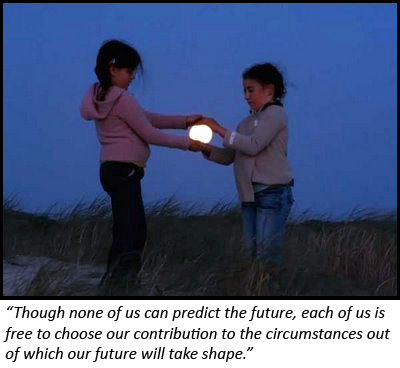I recently read this on a poster in the contemplative Santa Sabina Center in San Rafael, California where I spent six days on an Embodied Life™ retreat with Russell Delman.
While there, I continued my decades long reflection and investigation into how we contribute to the circumstances out of which our future does take shape each time we interact with others at home, at work, and in our communities.
Everyday we discover more about the human brain and how our attention and awareness can help us manage our habitual and often harmful survival instincts. We now know that practicing mindful awareness enables us to notice when our bodies and brains are being triggered into fight, flight, or freeze mode, so we can consciously choose how to respond to a situation constructively instead of what the more primitive parts of the brain often drive us to do: yell, check out, or play possum. In part, mindful awareness helps us make considered choices because it helps quiet the amygdala or the alarm bell in the mid brain making it less likely that we will get triggered in the first place.
As described by renowned neuroscientist Richie Davidson in The Mind’s Own Physician some forms of meditation strengthen the cortical regulatory circuitry in the brain that in turn modulates the dynamics of subcortical emotional reactivity”. Davidson’s research has also discovered that in addition to calming the more primitive, defensive reactions in the brain, mindfulness practices help us develop a disposition to be compassionate. More about this is an upcoming blog.
In addition to the contributions from brain science, we also know more about how to interact skillfully, in ways that engage the best of who we are and avoid triggering the more primitive parts of the brain. This includes asking thoughtful questions with genuine curiosity and listening attentively to others without preparing our rebuttal while a person is still talking.
Finally, over the past several decades, we have learned how to design and conduct inclusive and productive conversational processes for exploring complex issues and solving tough problems. Peggy Holman, Tom Devane, and Steven Cady describe sixty such processes in “The Change Handbook”. You might have heard of a few of them: Appreciative Inquiry, Dialogue, Open Space Technology, or the World Café. However, one word of caution: no one approach fits all situations. I believe it is essential that we all learn to custom design processes to fit the situation at hand. As with brain science, this is a field of knowledge that continues to grow with experimentation. To this I say hooray! We need both.
These three areas of knowledge and know-how are the focus of this blog. They position us to bring presence, skill, wisdom, and compassion to our conversations so we can talk constructively and find promising solutions and surprising new ways forward. We are capable of more individual and collective creativity than we may know. The future is a place we can create together through our interactions.
Next week, I’ll describe the surprising ways we get threatened and triggered in meetings, despite the absence of lions, tigers, or bears.

